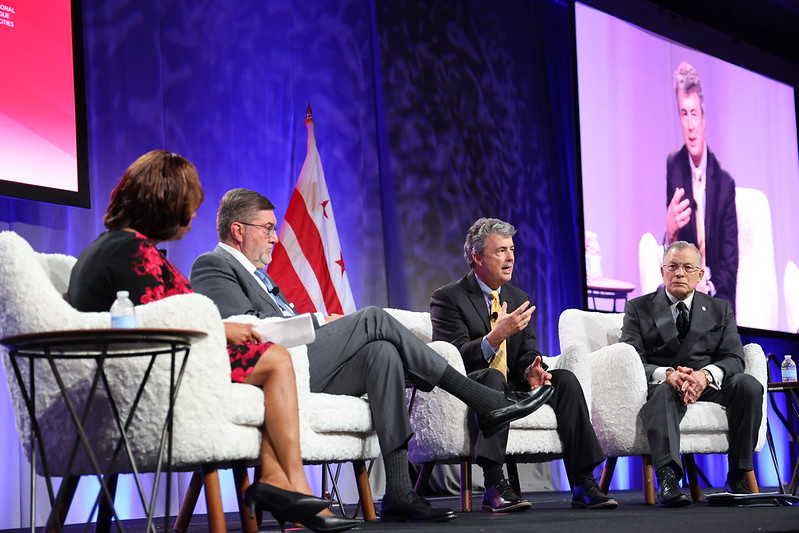March 12, 2024
![]()
 WASHINGTON, D.C. – On Monday, Alabama Attorney General Steve Marshall spoke at the
National League of Cities’ (NLC) Congressional City Conference on a panel focused on litigation
settlements with major opioid pharmaceutical distributors and manufacturing companies, and the
impact the opioid crisis has had on municipalities across the United States. NLC’s First Vice
President Sharon Weston Broome, mayor of Baton Rouge, moderated the panel discussion with
Attorney General Marshall; Donald Mason, mayor of Zanesville, OH; and Mark Hayes, executive
director of the Arkansas Municipal League. The Alabama League of Municipalities (ALM), an
affiliate of the NLC, and Attorney General Marshall’s office have been working together to ensure
that Alabama’s municipal leaders are taking advantage of more than $800 million in opioid
settlements.
WASHINGTON, D.C. – On Monday, Alabama Attorney General Steve Marshall spoke at the
National League of Cities’ (NLC) Congressional City Conference on a panel focused on litigation
settlements with major opioid pharmaceutical distributors and manufacturing companies, and the
impact the opioid crisis has had on municipalities across the United States. NLC’s First Vice
President Sharon Weston Broome, mayor of Baton Rouge, moderated the panel discussion with
Attorney General Marshall; Donald Mason, mayor of Zanesville, OH; and Mark Hayes, executive
director of the Arkansas Municipal League. The Alabama League of Municipalities (ALM), an
affiliate of the NLC, and Attorney General Marshall’s office have been working together to ensure
that Alabama’s municipal leaders are taking advantage of more than $800 million in opioid
settlements.
“Alabama’s first-in-the-nation approach to individually taking legal action against opioid
distributors and manufacturers allowed the state to directly address the devastating impacts of the
epidemic in our own backyard,” Attorney General Marshall said. “As a result, the state of
Alabama’s settlement amounts have been markedly higher than those states involved in the
national settlement agreement. These funds present a historic opportunity to alleviate the damage
that opioid abuse caused in our communities.”
According to the Centers for Disease Control and Prevention, Alabama ranked first place in the
nation for per-capita opioid prescriptions in 2022 with 74.5 prescriptions per 100 residents. In
2021, the Alabama Department of Public Health (ADPH) reported 1,408 overdose deaths in the
state, with 70% of those being opioid related. Furthermore, methamphetamine and fentanyl were
almost tied at No. 1 for being the drugs posing the greatest threat in Alabama, according to the
2022 Gulf Coast High Intensity Drug Trafficking Area (HIDTA) Treatment Assessment Survey.
They are followed by heroin, controlled prescription drugs, marijuana, cocaine and new
psychoactive drugs.
ALM Executive Director Greg Cochran recommended to NLC that the attorney general be a part
of the important panel discussion because of his leadership and efforts to support Alabama’s cities
and towns with this issue.
“We appreciate Attorney General Steve Marshall for fighting to get Alabama more funding in an
expedient way to assist our municipalities with combatting the opioid crisis. Unfortunately, we all
know someone, whether a loved one, friend or neighbor, who has been affected by this epidemic,”
Cochran said. “From newsletters to a webinar, our office has and will continue to work in
partnership with the attorney general’s office to ensure communities are utilizing the funds to
provide education, prevention resources and treatment options for their citizens.”
This past November, Attorney General Marshall sent a letter to local leaders statewide
emphasizing the importance of implementing long-term strategies for the opioid settlement funds.
These funds are shared with the state, local governments and public hospitals. Approximately 178
municipalities participated in each of the previous settlements. While there is some variation in
the approved uses amongst the settlements, they all generally require that these funds be spent to
address three broad categories of abatement: education, prevention and treatment.
Alabama municipalities are encouraged to collaborate regionally and use Attorney General
Marshall’s office as a resource as projects are proposed before the Alabama Legislature’s newly
established Oversight Commission on Alabama Opioid Settlement Funds. Even if a city did not
sign on to these settlements in 2022 and 2023, every city has the opportunity to work with their
county because all 67 counties participated.